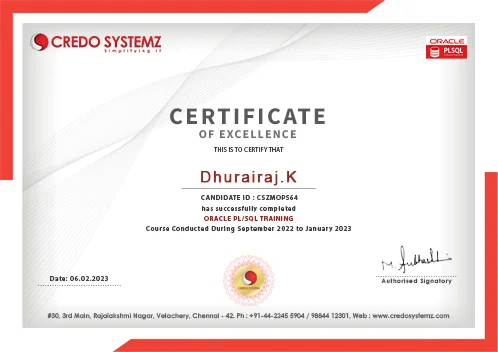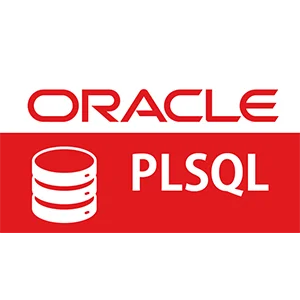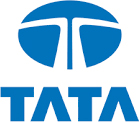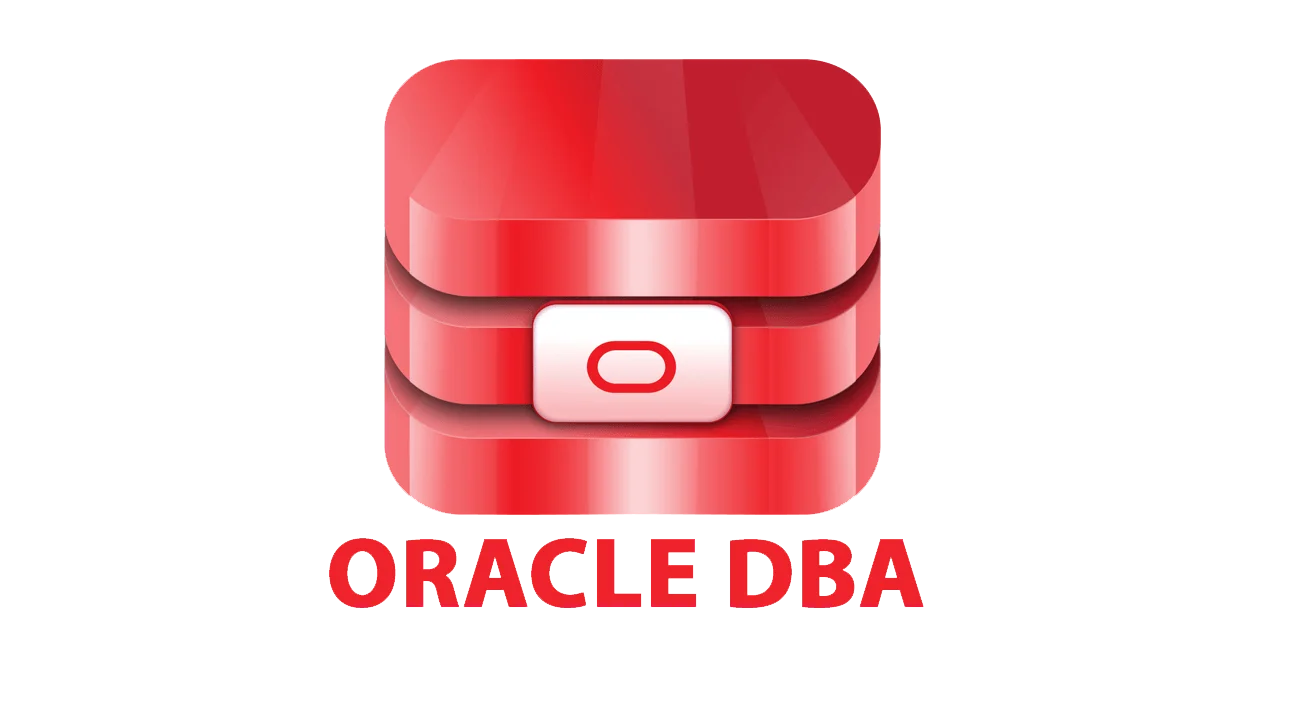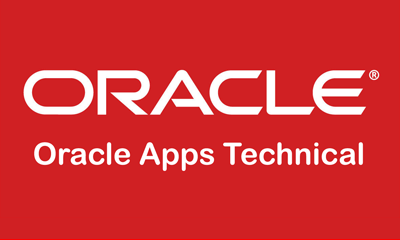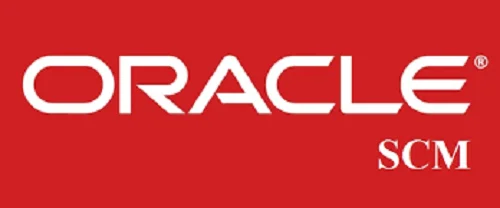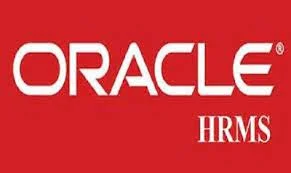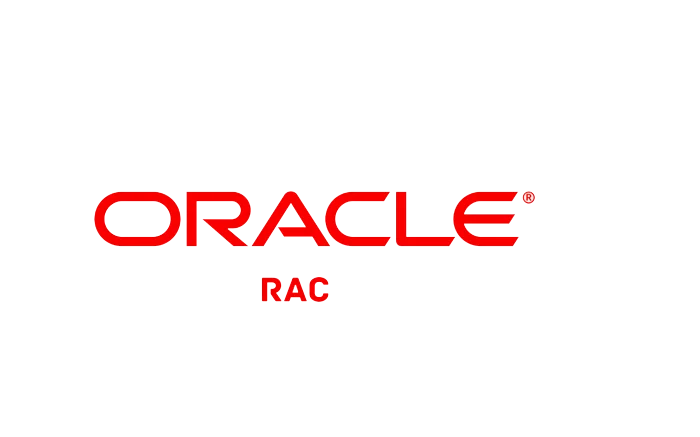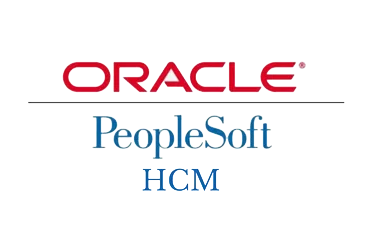-
Case Studies and Projects15+
-
Hours of Practical Training80+
-
Placement Assurance100%
-
Expert Support24/7
-
Support & AccessLifetime
-
CertificationYes
-
Skill LevelAll
-
LanguageEnglish / Tamil
Why Choose a Pl/Sql course from Credo?
Oracle training, the aspirants acquire the live hands-on session on troubleshooting, managing, configuring, best exposure of oracle and its applications. Also, we provides both Classroom and Online Training will access the Oracle training requirements and also offer Oracle Certification Guidance.
Find out what our past customers have to say about credo and their experiences with us
Flexible Mode of Training and Payment
Hear it from our customer!!
Our Oracle PL/SQL Training Overview
Our Oracle PL/SQL Certification training in Chennai assists in Professional skills development using hands-on practices. This Oracle PL/SQL Training offers 100% practical training with live sessions. Attend Our Oracle PL/SQL Training Demo to experience the live training sessions.
Credo Systemz Oracle PL/SQL course in Chennai aims at providing a well structured curriculum from scratch. This Oracle PL/SQL course covers the necessary modules hand picked by our industrial experts. Our Oracle PL/SQL Training course content suits both freshers and experienced professionals.Our Oracle PL/SQL Certification training in Chennai assists in Professional skills development using hands-on practices. This Oracle PL/SQL Training offers 100% practical training with live sessions. Attend Our Oracle PL/SQL Training Demo to experience the live training sessions.
Oracle PL/SQL is a procedural language designed specifically to embrace SQL statements within its syntax. Oracle PL/SQL program units are compiled by the Oracle Database server and stored inside the database. And at run-time, both PL/SQL and SQL run within the same server process, bringing optimal efficiency.
Our Best Oracle Pl/SQL Training in Chennai also guarantees you providing cost effective training, where you have to get training from top Pl/SQL Corporate Minds. Our satisfied candidate has ranked us as a Best Oracle Pl/SQL Training institute in Chennai with Practical/Hands-on training with free placement support. Check out the free placement drives conducted in our premises. Check out : Current Job Opportunities in our Client Company
Credo Systemz provides Best Oracle PL/SQL training. In this Oracle PL/SQL training will help you master the creation, implementation and management of very large database applications.
- Detailed instructor led sessions to help you become a proficient Expert in Oracle PL/SQL.
- Build a Oracle PL/SQL professional portfolio by working on hands on assignments and projects.
- Personalised mentorship from professionals working in leading companies.
- Lifetime access to downloadable Oracle PL/SQL course materials, interview questions and project resources.
Of course, our oracle certification is one of the recognized certification which will be provided to the candidates who completes the project, mock assessment and interview upon the completion of course. This Certification will help you to shows the candidate as a professional in this technology and it will strengthen your skills as well. Credo Systemz ranked as Best Oracle Training classes in Chennai velachery and OMR by provided our customers review across the internet.Book a free demo session with our Certified Oracle Experts to choose your own Oracle certification program.
- First thing, Oracle certification course will be handled by Oracle certified & experienced professionals.
- In our training program, Oracle course syllabus is desginedby more than 10+ years of experienced real-time Oracle developers with live projects.
- The most important part of our Oracle Training Institute in Chennai is to enhance and upgrade the skill set of the beginner level into a professional level developer.
- Also,Our training will be conducted via online, classroom and corporate as both weekday, weekend and fast track session according to the candidate’s requirement.
- Our Oracle Training Course content ensures the complete real time Practical oriented sessions.
- Most Importantly, we will guide you to complete Oracle certification in chennai which will help you to get certified and stand out in a crowd.
- Offered the best training for Oracle Certification and also guide for your Career Opportunities.
- Likewise, Providing the best Oracle training and certification in affordable course fees.
- Also, We are equipped with a standard classroom environment to learn the Oracle Training and all their requirements and also we offering 100% Placement assistance.
Contact Us
+91-98844 12301 / +91-96001 12302
Training Benefits!!
Oracle PL/SQL is a powerful tool for creating complex database applications, improving performance, and managing data effectively. Our Oracle PL/SQL Training in Chennai provides complete training to acquire the skills to build real world applications. Learn the industrial knowledge to be the best Oracle Professional using Our Oracle PL/SQL Course in Chennai.
-
5-15%
5-15% Chances of immediate placements.
-
10-15%
10-15% increase in salary.
-
~30%
30% of job market is open.
Testimonials
-
Using database experts, I completed the Credo Systemz Oracle PL/SQL training in Chennai. This Oracle PL/SQL Course provides Practical training with real world examples. They also offer projects, certification and interview support. Thanks to my trainer.
Mithran

-
Credo Systemz Oracle PL/SQL training ensures instructor-led training with placement assistance. This Oracle PL/SQL Course offers hands-on practices to gain the skills. It includes theory + practical training with projects and practices.
Rithvik Raj

Join Us
CREDO SYSTEMZ provides the Best Oracle PL/SQL Training in Chennai to promote you into a skilled professional with 100% Free Placement Support.
Join NowOracle PL/SQL Course FAQs
Oracle Database is a Multi-model relational database management system(RDMS) which is produced by Oracle Corporation. It can be commonly used for running data warehousing, online transaction processing and database workloads. Also, Oracle Database is the first database designed for enterprise grid computing, the most important it’s flexible and cost-effective way to manage applications and information.
- Scalability and Performance
- Backup and Recovery
- Data Redundancy and Availability
- Portability
- Customer satisfaction
- Enhanced Security
Credo systemz course training programs enhance your skills from basic to advanced level and place you in your dream job roles, There are various roles which is listed below:
- Oracle Developer
- Oracle Application Framework
- Oracle Finance Functional Consultant
- Database Administrator
- Database Developer
- Data Analyst
- Business Analyst
This question has been asked frequently by Most of the candidates while enquiring about our Oracle PL/SQL training in Chennai
Here is the answer for you,
- This is a Beginner course and hence no specific prerequisites
- Basic computer knowledge is desirable
- Reduces Network Traffic
- Error Handling
- Improved Performance
- Portability
- High-Security level
- Support for object-oriented Programming
- Freshers
- Developers
- Database administrators
- Web server administrators
- Implementation specialists
- Data center support engineers
Our Alumni Work in top MNC’S
Credo Systemz has placed thousands of students in various top multinational organiation, witnessing the progress of our alumni gives us immense gratification.
Join the success community to build your future
Enroll nowGet Industry Recognized Certification
Credo Systemz oracle certification is one of the recognized certifications which is provided to those who complete this course successfully. Our Oracle PL/SQL certification showcases the in-built knowledge of Oracle PL/SQL with global recognition.
Benefits of Oracle PL/SQL Certification
- To demonstrate the Proficiency of Oracle PL/SQL with its skills.
- To add weightage to your Professional resume.
- To stand out in the job market with guaranteed performance.
- To enhance your credibility in using Oracle PL/SQL.
